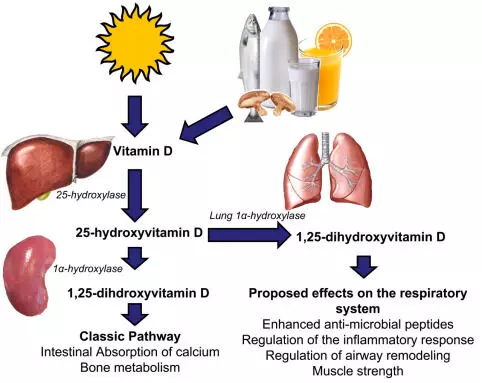Vitamin D Deficiency tied to increased Respiratory Infection Risk in Preschool Children: Study
- byDoctor News Daily Team
- 30 September, 2025
- 0 Comments
- 0 Mins

Researchers have found in a new study that vitamin D deficiency independently increased the risk of respiratory infections in preschool children, especially in vulnerable groups. Hence, targeted screening and supplementation may help reduce early childhood morbidity. Vitamin D is well known for its role in skeletal health and calcium metabolism, but in recent years growing evidence has pointed to its broader influence on immune regulation. Preschool children are particularly susceptible to respiratory infections due to the immaturity of their immune systems and frequent exposure to pathogens in daycare and school environments. Identifying modifiable risk factors, such as micronutrient deficiencies, is critical in reducing the global burden of pediatric respiratory illness. In this new investigation, researchers evaluated vitamin D status in preschool children and analyzed its association with the frequency of respiratory infections. The findings showed that children with vitamin D deficiency were more likely to develop recurrent respiratory tract infections compared to those with sufficient levels. Importantly, this association persisted even after adjusting for other contributing factors such as age, nutrition, and environmental exposures, suggesting that vitamin D deficiency is an independent risk factor rather than a byproduct of poor health. The implications of these results are significant for both clinical practice and public health. Routine screening for vitamin D levels in preschool children, particularly in regions with limited sunlight exposure or in populations with dietary inadequacies, may provide an opportunity for early intervention. Supplementation strategies tailored to at-risk groups could help strengthen immune defenses and reduce the frequency and severity of infections. This in turn has the potential to decrease healthcare utilization, lower parental stress, and improve long-term child development outcomes. Nevertheless, the authors emphasized the need for randomized controlled trials to establish optimal supplementation protocols and confirm the causality of the observed association. Future studies should also examine whether vitamin D supplementation can directly lower infection incidence and severity in diverse populations of children. Keywords:Vitamin D deficiency, preschool children, respiratory infections, pediatric health, supplementation, immune function, morbidity risk
Disclaimer: This website is designed for healthcare professionals and serves solely for informational purposes.
The content provided should not be interpreted as medical advice, diagnosis, treatment recommendations, prescriptions, or endorsements of specific medical practices. It is not a replacement for professional medical consultation or the expertise of a licensed healthcare provider.
Given the ever-evolving nature of medical science, we strive to keep our information accurate and up to date. However, we do not guarantee the completeness or accuracy of the content.
If you come across any inconsistencies, please reach out to us at
admin@doctornewsdaily.com.
We do not support or endorse medical opinions, treatments, or recommendations that contradict the advice of qualified healthcare professionals.
By using this website, you agree to our
Terms of Use,
Privacy Policy, and
Advertisement Policy.
For further details, please review our
Full Disclaimer.
Recent News
DME Haryana round 3 NEET counselling dates revised
- 27 October, 2025
Hospital lapse: GB Pant website continues to name...
- 27 October, 2025
NEET counselling: MP DME releases final vacancies...
- 27 October, 2025
Novo Nordisk gets MHRA nod for Concizumab to preve...
- 27 October, 2025
Daily Newsletter
Get all the top stories from Blogs to keep track.


0 Comments
Post a comment
No comments yet. Be the first to comment!